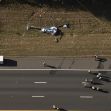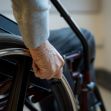A Massachusetts man has filed a $9.5 million lawsuit against the U.S. military after he crashed his snowmobile into a parked military Black Hawk helicopter.
The crash happened in March 2019 in Worthington, Massachusetts, when 48-year-old Jeff Smith was riding his snowmobile along a snowmobile track that ran through a rarely used airfield.
The Black Hawk helicopter was parked on the airstrip after it flew down for night training from New York’s Fort Drum. As Smith was coming down the track during the evening hours, he struck the tail end of the 64-foot aircraft.
Smith argues in his lawsuit that the helicopter’s crew did not do enough to protect him. He argues that the military should have warned snowmobilers who were using the track that day that the helicopter would be on the trail. Instead, he says that the military left the helicopter unattended for a period of time, failed to illuminate it, and created a hazard that resulted in his injuries.
The military has tried to dismiss the case several times, explaining that the airstrip had been approved by the Federal Aviation Administration and that night training such as the one conducted by the Black Hawk in March was often conducted in similar locations. However, Smith has pushed back saying that it has been decades since an aircraft used the strip and that he had driven his snowmobile across the track over 100 times and has never seen a military aircraft parked on the strip.
In its attempted dismissals, the military argues the lawsuit cannot be brought forward because it is protected under the Federal Tort Claims Act. The Act which, generally protects the military from lawsuits brought by active duty service members who are injured while on duty, is argued to be applicable in this case because it involves a policy decision regarding the helicopter’s usage.
The military has also argued that there is a jurisdictional concern and that the crew was not alerted they were landing on a snowmobile trail when they touched down.
Smith's lawyer, Douglas Desjardins, explains, “Our argument from the beginning has been that it’s incompatible to have a helicopter land on an active snowmobile trail,” adding, “The Army internal investigation showed pretty clearly that the crew knew that they were landing right before or right after on an active snowmobile trail. What bad could happen there? You know, helicopter on a snowmobile trail where folks go fast.”
Most recently, the military has pushed back against Smith's condition at the time of the crash. They've stated that Smith was under the influence of prescription drugs at the time of the accident, had consumed two beers before his crash, and was driving his snowmobile at more than 65 mph.
The Army conducted an investigation which concluded there was “no negligence by the crew,” that the crew “complied with all applicable regulations and laws,” and “Furthermore, given the particular circumstances of this incident, I am not convinced that using such chem lights or similar devices would have prevented the collision.”
Smith was visiting his parent's home in the evening hours before he returned home on the trail where he would later crash into the helicopter. He said that as he was driving alongside the farm fields and forests, his headlights reflected off “something,” but he was not aware it was a helicopter until after he had crashed.
Benjamin Foster, one of the crew members on the helicopter, shared with reporters, “I found him face down in the snow. We rolled him on his back and I might remember yelling or telling one of my crew chiefs to grab some trauma shears and space blankets from the aircraft... I remember him gasping for breath.”
As a result of his accident, Smith suffered severe injuries including loss of movement in his left arm, respiratory issues, and the inability to work. Smith maintains that winning the lawsuit would allow him to pay for his medical bills along with other expenses that resulted from his accident.






